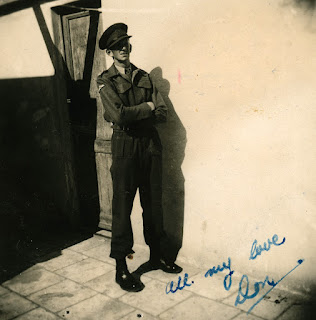International Archives Day
Did you know that June the 9th is International
Archives Day? To celebrate, archive services from around the world were
invited to submit an image from their collections and send a message to
archival colleagues around the world. See if you can find all the contributions
from New Zealand in the photo page,
according to the NZ Records email list there are nine.
Information about the gestation of International Archives Day
and the reasoning behind it can be found at the International
Council on Archives website. The hashtag #IAD15 was also really enjoyable
to follow on Twitter throughout the day; happily Britain’s National Archives
have collated them in Storify
form.
All of Auckland Libraries’ Research
Centres hold archival collections, as does the Birkenhead Library which is
home to the Chelsea
Sugar Refinery’s archive. Through sheer coincidence the subject of both of
Auckland Libraries’ contributions were the personal papers of decorated war heroes.
The North Auckland Research Centre submitted a family
photograph of Major Donald
Stott representing the collection of his letters that is held there. Major
Donald Stott’s extraordinary World War 2 career encompassed the Greece and Crete
campaign, escape from a POW camp, working with the Greek resistance, two
Distinguished Service Order awards, and service with Australia’s “Z” Special
Unit – work so secret some details of his military records were not released
for many years after his death in Borneo at the end of the Second World War.
Throughout the war he wrote home to his family in Birkenhead, Auckland, and
these letters, covering the period 1940-1945, provide a vivid and engaging
account of his experiences. The collection was deposited with the North
Auckland Research Centre, Takapuna Library, by his niece Barbara Lewis and was recently
the basis of a successful exhibition.
The image that Sir George Grey Special Collections submitted
was a picture of one of John
A. Lee’s scrapbooks. Iain Sharp wrote about this collection for the book Real gold:
“Swagman, convict, war hero,
charismatic public speaker, renegade politician, bestselling author, hotel
manager, bookseller – John
Alfred Alexander Lee had an unusually eventful and varied life. Born in
Dunedin in 1891, raised by an impoverished solo mother, he drifted into crime
as a teenager, leading to periods of detention in Burnham Industrial School and
Mount Eden Prison. He enlisted in the New Zealand Expeditionary Force in March
1916 and was awarded a Distinguished Conduct Medal in June 1917 for
single-handedly capturing a German machine-gun post in the Battle of Messines.
A wound at Mailly-Maillet in March 1918 resulted in the loss of his left arm.
Lee began writing political
articles during his soldiering years. After the war he devoted his exceptional
skills as an orator to the Labour Party. His fortunes at electoral polls
fluctuated during the 1920s and early 1930s. Sometimes he was a member of
parliament, sometimes not. He had a stint managing a hotel in Rotorua (although
he was himself a teetotaller). He wrote two popular novels based on his early
life, The children of the poor and The hunted.
When Labour became the government
after a landslide victory in the 1935 election, Lee expected a high cabinet
ranking, but he was disappointed. His impetuous temperament clashed with the
natural caution of the Prime Minister, Michael Joseph Savage, who considered
Lee reckless and therefore risky. Lee’s increasingly bitter and outspoken criticisms
of Savage and the Minister of Finance, Walter Nash, led to his expulsion from
the Labour Party in 1940. His attempt to form a breakaway party met with little
success from New Zealand voters. In later years he focussed on Journalism,
authorship and the management of Vital Books, the shop he established in Mount
Eden, Auckland, in 1950. He died in June 1982.
In
his will Lee asked that his private papers be deposited with Auckland Libraries a year after his death. Amongst his papers are his scrapbooks, which
reflect his bustling, energetic, highly opinionated personality. Photographs
and newspaper clippings have been hastily attached with pink Elastoplast (an
expedient method for a one-armed man of limited patience). There are copious
annotations in red ballpoint - warm and generous to family and friends but
still nursing grudges, decades later, against old foes. “
Author: Andrew Henry. With information from Real Gold by Iain Sharp, Sir George Grey Special Collections.


Comments
Post a Comment
Kia ora! Please leave your comment below.